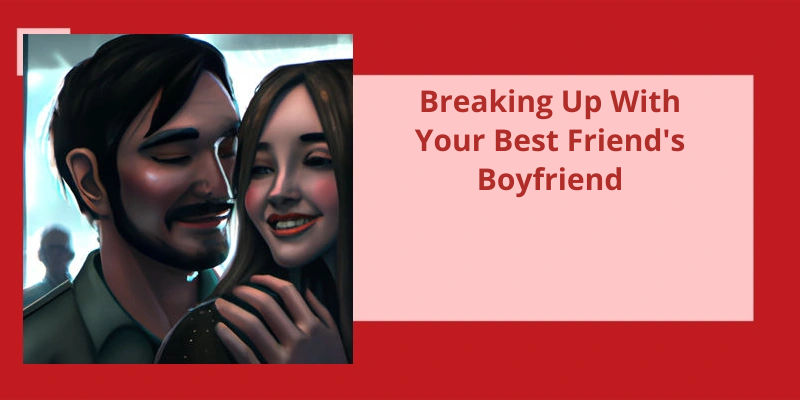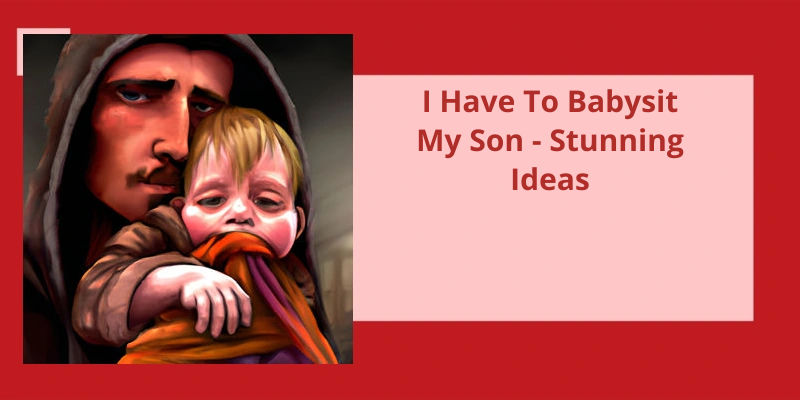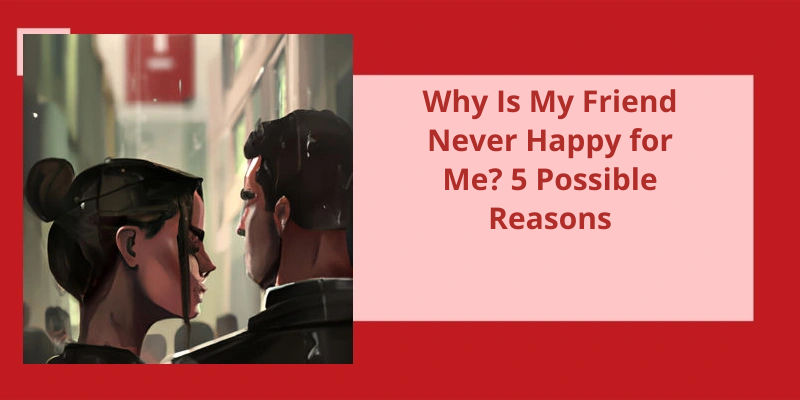Breaking up with a best friend boyfriend can be one of the most difficult experiences of one's life. The pain and confusion that come with such a decision can leave one feeling lost and alone. For many, the end of a romantic relationship can seem like the end of everything, but the loss of a best friend can be equally devastating. The bond between best friends is one of the strongest and most enduring, and when that bond is broken, the fallout can be immense. However, with time and reflection, the breakup can also serve as an opportunity for growth and self-discovery, allowing one to reevaluate the qualities and values that are truly important in a relationship.
How Do You Deal With Friends Dating Each Other?
When it comes to friends dating each other, it can be a tricky situation to navigate. First and foremost, it’s important to not freak out. While it may be surprising and may cause some initial discomfort, it’s essential to take a step back and evaluate the situation objectively. It’s important to recognize that your friends are adults who’re capable of making their own decisions, including who they decide to date.
However, it’s also important to keep in mind that this situation could potentially end badly. Watching two of your closest friends break up can be incredibly difficult, and can even put a strain on your own friendship with each of them. It’s important to make sure youre mentally prepared for this possibility.
Above all, you should strive to be supportive of your friends relationship. Theyve chosen to take this step for a reason, and it’s important that they feel like they’ve your support. Listen to them, offer advice if asked, and make an effort to get to know their partner.
At the same time, it’s important to know how to set boundaries. Just because your friends are dating doesn’t mean that they now have the right to monopolize all of your time and attention. Make sure youre still taking care of yourself and your own needs, and don’t be afraid to say no to social invitations if you need some time to yourself.
Finally, it’s important to be prepared for a potential breakup. Even the strongest relationships can come to an end, and it’s important that youre mentally and emotionally prepared to support your friends through this difficult time. Remember that it’s okay to feel sad or uncomfortable, but make sure to listen to your friends and offer them as much support as you can. Take a deep breath and remember that you can get through this difficult situation together.
It’s not always easy to tell your best friend that you don’t like their significant other. It’s a delicate situation that requires a careful approach. There are a number of things you can do to express your concerns without damaging your friendship or their relationship. Here are a few tips to help you navigate this challenging conversation.
How Do You Tell Your Best Friend You Don’t Like Their Boyfriend?
2) Share your concerns. If your friend is receptive to it, gently share your concerns about her boyfriend. Be sure to express that you care for her and want to see her in a happy and healthy relationship. Avoid attacking her boyfriend or making it personal.
Another approach could be to share your own experiences or observations without directly criticizing her boyfriend. For example, you could say, “Ive noticed some red flags in past relationships and it’s made me more cautious. Have you noticed anything that concerns you about your relationship?”
3) Be supportive. Even if you don’t like her boyfriend, try to be supportive of your friends decisions and make it clear that youre there to support her no matter what. This doesn’t mean you’ve to agree with everything she does, but it shows that you respect her and her choices.
4) Listen. When your friend talks about her boyfriend, make an effort to truly listen and understand where shes coming from. Instead of interrupting or trying to push your own agenda, try to understand her perspective and offer support and empathy.
5) Respect boundaries. If your friend doesn’t want to talk about her relationship or feels defensive about her boyfriend, it’s important to respect those boundaries. Pushing too hard can damage your friendship and make your friend feel like shes being attacked. Instead of pushing, offer your support and let your friend know that youre there for her when shes ready to talk.
6) Keep the lines of communication open. Even if you don’t agree with your friends choices, it’s important to keep the lines of communication open and maintain your friendship. Remember that your friend is an adult and has the right to make her own decisions, even if theyre not the ones you’d make. By offering support and understanding, you can help your friend navigate through difficult times and find happiness in her own way.
7) Consider the Timing. It’s Important to Choose the Right Time to Have This Conversation With Your Friend. Avoid Bringing Up Your Concerns About Her Boyfriend When She’s Already Stressed or Upset About Something Else. Pick a Time When She’s Relaxed and Open to Hearing What You Have to Say.
When talking to your friend about her boyfriend, it’s crucial to choose the right moment. Avoid bringing it up when she’s upset or stressed about something else. Instead, choose a time when she’s relaxed and open to listening to your concerns.
Source: How To Tell Your Friend You Don’t Like Her Boyfriend
The decision of whether to remain friends after a breakup can be a difficult one. Some people feel that cutting off all contact is necessary for moving on, while others believe that a friendship can still exist. Whatever your personal preference may be, it’s important to be honest with yourself and your partner about your feelings. In some cases, seeking the advice of a professional can help you navigate this tricky situation.
Is It Okay to Break Up and Still Be Friends?
When it comes to breakups, there’s no one-size-fits-all answer. The decision to remain friends after breaking up is a complex one. It depends on a number of factors, such as the length of the relationship, the reason for the breakup, and the personalities of both parties involved. If you feel like you cant be friends with your ex-partner, that’s completely normal and okay. Sometimes, cutting ties is necessary for healing and moving on.
However, staying friends post-breakup can have some benefits. It can be a sign of emotional maturity and a desire to maintain a valuable connection with someone who’s played a significant role in your life. It also allows for the possibility of later reconciliation if both parties are still interested. Additionally, if you’ve been in a long-term relationship, chances are you’ve built a solid foundation of trust, understanding, and communication. Maintaining this bond can provide comfort and familiarity during a difficult time.
This may involve giving each other space, avoiding certain topics, or limiting communication until both parties have healed. It’s also important to be honest and upfront about your feelings, so that there are no misunderstandings or hurt feelings.
It’s important to consider all factors and make a decision that’s best for you. Seeking the advice of a therapist or counselor can be helpful in gaining perspective and making an informed decision about your post-breakup relationship. Remember, healing takes time and self-care should always be a priority.
When it comes to disliking your best friend’s significant other, it can be a tricky and uncomfortable situation to navigate. However, there are a few important things to keep in mind to handle it with grace and care. It’s crucial to ensure that your negative feelings toward their partner aren’t stemming from any other underlying issues, and to try to give them a fair chance by looking beyond your first impression. Avoid catastrophizing or making assumptions about their relationship, and remember that the reasons you may not get along with their partner could potentially be because of similarities between the two of you. Above all, be mindful of your words and actions, and stay focused on supporting and uplifting your friend no matter what.
How Do I Deal With Hating My Best Friend’s Boyfriend?
It’s important to first acknowledge that hating your best friends boyfriend is a complex issue and requires a careful approach. If the issue truly lies with the boyfriend, it’s important to address it tactfully.
One helpful strategy is to get past first impressions. Often times, we form snap judgments about people that may not be entirely accurate. Try spending more time around the boyfriend and getting to know him on a deeper level. You may find that he’s redeeming qualities that weren’t apparent at first glance.
Another important step is to avoid catastrophizing. It’s easy to focus on the negative aspects of the boyfriends personality or behavior and blow them out of proportion. Instead, try to take a more balanced perspective and recognize that no one is perfect. It’s possible that the boyfriend annoys you simply because he’s qualities that are similar to your own.
It’s crucial to avoid saying anything youll regret, even if the boyfriend and your best friend break up. Remember that words can have a lasting impact and can strain relationships. Instead, try to focus on finding a constructive way to address your concerns, such as scheduling a one-on-one conversation with your best friend.
Lastly, it’s essential to prioritize supporting and hyping up your friend. Even if you don’t personally like her boyfriend, your friend does, and it’s important to respect her feelings and choices. Avoid criticizing or bad-mouthing the boyfriend to your friend, as this can damage your friendship and potentially drive your friend away.
Remember to approach the situation with an open mind, focus on the positives, and prioritize your friends happiness.
How to Address Concerns About Your Best Friend’s Boyfriend Without Being Judgmental?
- Listen actively to your friend’s concerns
- Acknowledge your friend’s feelings without judging
- Offer support and understanding
- Ask open-ended questions to help your friend clarify their concerns
- Encourage your friend to talk to their boyfriend directly
- Offer to be present during the conversation if your friend needs support
- Suggest seeking outside help from a therapist or counselor
- Remind your friend that ultimately it’s their decision to make
Breaking up with a friend can be just as emotionally challenging as ending a romantic relationship. It’s important to approach the situation with care and consideration to minimize hurt feelings and preserve mutual respect. Here are six tips to help you navigate the process of ending a friendship with grace.
How Do You Tell Your Best Friend You Want to Break Up?
Breaking up with a close friend can be one of the most difficult things to do. You may have shared countless memories and experiences with them, but as time goes on, you may begin to realize that you no longer share the same values, beliefs, or interests. This can leave you feeling uncertain about how to approach the situation. However, ignoring these feelings can lead to resentment and anger, which can only make the situation worse.
The first step in breaking up with a good friend is to pinpoint the major issues in the friendship. Ask yourself what’s changed in the relationship, and why you no longer feel connected to your friend. Is it a difference in values, behavior, or simply growing apart? Understanding the root cause of the issue can help you clarify your thoughts and feelings, making it easier to communicate them to your friend.
Once you’ve identified the major issues, you should decide whether you want to end the friendship immediately or phase the break over time. Consider how your friend might react to a sudden breakup versus a gradual one. If you’ve been friends for a long time, a sudden breakup can be particularly devastating. But sometimes, a clean break is better than dragging it out, especially if there’s been a breach of trust or a serious disagreement.
When you’re ready to have the conversation, it’s essential to keep the confrontation cordial. Use “I feel” statements to express your concerns, rather than blaming your friend for the problems in the relationship. This approach can help prevent defensiveness and allows your friend to understand why you’ve arrived at your decision. Remember, breaking up with a good friend means ending a relationship, not necessarily ending a person.
It’s also crucial to approach the conversation from a place of compassion and empathy. Make an effort to listen to your friends responses and validate their feelings, even if they’re hurt or upset.
Lastly, consider consulting with a therapist before making the split. A therapist can help you understand your motivations for ending the friendship and provide guidance on how to approach the situation. They can also help you navigate the difficult emotions that may arise during the process and ensure that you’re making a decision that’s in your best interest.
By identifying the major issues in the friendship, considering how to approach the conversation, keeping the confrontation cordial, approaching the conversation with compassion and empathy, and seeking guidance from a therapist, you can make the process as smooth as possible and move forward with your life. Remember, ending a friendship may be the end of one chapter, but it also opens up the opportunity for new connections and experiences in the future.
Signs That It’s Time to End a Friendship
As humans, we may need to close the doors to friendships that no longer serve our best interests. Some signs that it may be time to end a friendship include feeling drained, feeling like you’re putting in more effort than the other person, disagreements about fundamental beliefs, or consistent negative behavior towards you. It’s important to prioritize your well-being and let go of toxic relationships.
It’s a sad reality that not all best friendships last forever. As we grow and change, so do our relationships. Whether due to personal differences or toxic behavior, friends can sometimes grow apart and call it quits. Although it may be difficult to accept, it’s important to recognize that this is a normal part of life. In this article, we’ll dive into why friendships can come to an end and offer tips on how to cope with the loss.
Is It Normal for Best Friends to Break Up?
It’s important to remember that friendships, like all relationships, require maintenance and effort from both parties. It’s not uncommon for friends to grow apart over time, especially as their lives and priorities change. While it may be difficult to accept at first, the end of a friendship can also be an opportunity for growth and self-reflection. It’s important to acknowledge your feelings and give yourself time to grieve the loss of your friendship.
One reason that best friends may break up is due to toxic behavior. This can include anything from jealousy and manipulation to consistently putting the other person down. If you feel like your friendship has become toxic, it’s important to have an honest conversation with your friend and set boundaries. However, if your friend is unwilling or unable to change their behavior, it may be necessary to cut ties. It’s important to prioritize your own mental health and well-being.
This can include moving away, starting a new job, or entering a new relationship. While it may be difficult to maintain a friendship in the face of these changes, it’s important to communicate openly and honestly with your friend. If both parties are willing to put in the effort, it’s possible to maintain a strong friendship despite the distance.
Sometimes, best friends may simply grow apart due to changing interests, beliefs, or values. This can be a painful realization, but it’s important to acknowledge that people change and evolve over time. It’s okay to outgrow a friendship and move on to new relationships that better align with your current self.
The Impact of Social Media on Friendships and How It May Contribute to Friendships Breaking Up.
Social media can have a negative impact on friendships as it may lead to misunderstandings, jealousy, and increased comparison between friends. It can also provide a platform for passive-aggressive behavior and cyberbullying. Ultimately, if not managed properly, social media can contribute to friendships breaking up.
Conclusion
It not only affects your relationship with your friend but also with their significant other, whom you may have developed a strong bond with. It's important to approach the situation with empathy and honesty, while also setting boundaries to protect your emotional well-being. Remember that friendships can sometimes evolve and change, and it's okay to prioritize your own needs and feelings. Though the process may be tough, it can ultimately lead to growth, self-discovery, and the opportunity for new and fulfilling connections with both your friend and others in your life.






